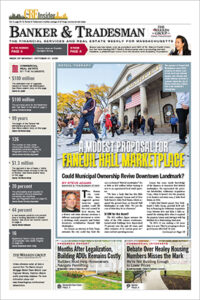The luxury condominium market in Boston is not going bust, but it sure is slowing down.
Gone are the days when posh new residential towers were almost sold out when they opened, accompanied by gushing stories in the media about record-breaking penthouse sales and the like.
Sure, the marketing teams pitching newly opened condo towers like the St. Regis Residences in the Seaport or Winthrop Center in the Financial District insist that sales are going just swimmingly, and maybe that’s the case, to a certain extent.
Yet it’s also pretty clear the developers behind these and other newly opened Boston condo towers have a long road ahead when it comes to selling off their multimillion-dollar units, with no guarantees.
The real estate market writ large remains mired. And the big increase in interest rates of the last 12 months has put a dent in the number of buyers at the lower end of the luxury condo market and where they still may need some sort of a mortgage to afford that $2 million unit.
And while on one level, the economy doesn’t look so bad – just glance at the unemployment rate – turmoil in the banking sector, still-higher-than-comfortable inflation and yet another pivotal presidential election in a little over a year has cast a pall over what would otherwise be a pristine outlook.
Sales of luxury condos worth more than $1 million dropped by roughly a quarter, while the median price fell by 15 percent, to $1.7 million, according to the Boston office of Gibson Sotheby’s International Realty.
“Certainly, we have gone through a little bit in the world with COVID and the banking crisis,” said Cathy Angelini, sales director at the 118-unit St. Regis, which opened last fall. “Do I wish we had sold out? Of course. I am very positive this building is on target.”

Just over 15 percent of the units in Back Bay’s One Dalton luxury skyscraper, left, still sit unsold four years after the tower opened. iStock photo
How Full Is the Glass?
Half full or half empty? That’s one question to be asked as an assortment of new condo towers compete for buyers and pushes to keep the sales momentum going.
When it comes to closed sales at the St. Regis the Suffolk Registry of Deeds showed 43 of its 118 condos have sold as of publication time, with 22 sales so far in 2023. Add in pending sales that haven’t closed yet, according to Angelini, and that percentage crosses the halfway point.
Buyers have tended to hail from two of Boston’s biggest business sectors, including some hedge fund types and biotech executives.
Among those pending sales are a pair of deals totaling $25 million for two units at the high-rise overlooking Boston Harbor from its perch at 150 Seaport Blvd., she said. The buyers were empty-nesters, with the units, originally four-bedrooms, having been converted to three-bedrooms in order to create a more spacious feel.
And turmoil in the stock market, in some cases, has actually increased the appetite on part of some buyers for real estate, which is still seen as a comparatively safer bet.
“I feel these people are fine pulling money from the stock market and from other, seemingly more risky investments,” Angelini said.
One Dalton a Cautionary Tale
A little bit further behind the sales curve is Winthrop Center, the new Financial District tower that along with hundreds of thousands of square feet of office space, also includes 317 condos.
Twenty deeds for units in the residential portion of the tower, which opened this spring, sit recorded in the Suffolk Registry. And Millennium Partners, in a recent story in the Globe, stated another 45 are under contract. That number now seems to have increased and there may be approaching 80 condos sold or spoken for at 240 Devonshire St.
That puts the number of condos either sold or committed to buyers at something just over the 25 percent mark, Rich Baumert, principal with MP Boston, said in a statement.
“The response to The Millennium Residences at Winthrop Center has been tremendous,” he said. “We are confident in both residential and office components of this building; there is no luxury residential experience like this elsewhere and the workplace environment is unparalleled.”
Yet the predictable proclamations of success by luxury developers have to be taken with a grain of salt. Hyping the numbers, whatever they might actually be, is all part of the marketing game.
The deluxe One Dalton tower opened in 2019 to rave reviews and gushing articles in the local press about the record-breaking prices fetched by its condos, including $34 million for a penthouse.
The development and marketing of the Four Seasons have been seen as the gold standard in the local luxury condo world.
Yet four years later, roughly a quarter of the tower has either been put up for resale or is sitting empty.

Scott Van Voorhis
More than a dozen condo owners are now trying to sell their units at the Henry Cobb-designed Back Bay tower, while at least 25 other units in the tower have sat empty since it opened, never sold for one reason or another.
It was a well-kept secret, with most people, including those in the business of selling real estate, having assumed the tower had sold out long ago.
If nothing else, One Dalton provides a cautionary tale for anyone attempting to gauge the true health of the luxury condo market. As that old Cold War saying put it: Trust, but verify.
Scott Van Voorhis is Banker & Tradesman’s columnist; opinions expressed are his own. He may be reached at sbvanvoorhis@hotmail.com.





